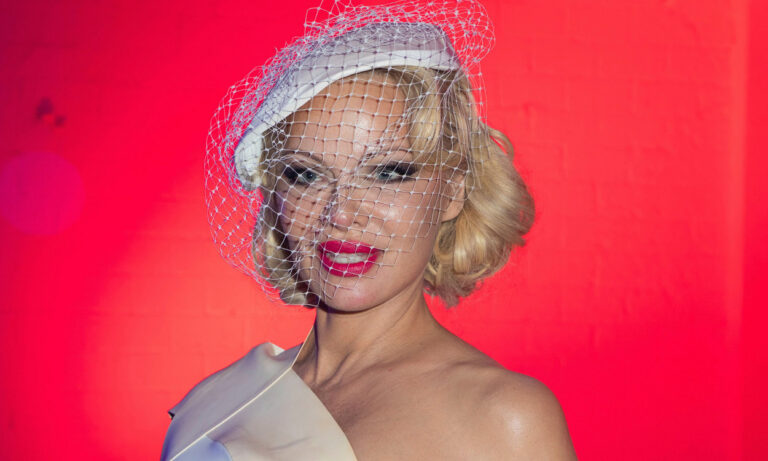What the Netflix documentary Pamela, A Love Story won’t tell you about Pamela Anderson
Every gen Zer’s older sibling grew up with Pamela Anderson. From Baywatch to Borat, Anderson established herself as a true 90s sex symbol—selling regular people the ‘American dream’. Never one to shy away from her vulnerability, the Canadian-American actress helped pioneer a liberation movement, hinged on the idea that a woman could not only profit financially from her sexuality, but that she could also enjoy it without fear of being judged or labelled.
In many ways, Anderson’s attitudes towards sexuality make her a prime candidate for present-day feminism’s roster of radical women. However, the story isn’t so straightforward. Anderson’s made a number of insensitive and inaccurate comments over the years, both in regard to the #MeToo movement and sexual identity. And that’s not even mentioning the painful moment in 2019 when she participated in some hardcore native american cultural appropriation, and afterwards refused to apologise for it.
So, with the model’s new Netflix documentary Pamela, A Love Story, about to drop on 31 January 2023, we thought it’d be helpful to run through the complicated contradiction that is Pamela Anderson.
How did Pamela Anderson encourage a sexual revolution?
When we reference Anderson’s impact on the sexual landscape, we’re not referencing her participation in one of the most sought-after sex tapes of the 21st century. Not only was that salacious leak a serious breach of privacy and incredibly traumatic incident for Anderson, it doesn’t define her as an individual and is not relevant to this particular argument.
Also, it should be noted that Anderson had no association with the infamous drama series Pam & Tommy, which dominated the lives and wardrobes of gen Zers after it aired in February 2022. In fact, she was actively opposed to its creation.
When the Baywatch actress first broke onto the scene, she was marvelled at for her impressive physique. It truly isn’t an understatement to say that every inch of her body was examined, discussed and drooled over. It makes sense, she represented a carbon copy of what society explicitly told us was attractive—blonde, big boobs, tanned and toned. It’s not hard to get to grips with why so many men fawned over her.
Although, it should of course be noted that society’s obsession with Anderson’s aesthetic was inherently associated with the toxic body standards pushed upon young women throughout the 90s, 2000s and arguably still today.
But what really made Anderson such an iconic public figure was the way in which she harnessed that privilege and power, and used it for her own success—while simultaneously pushing the envelope in regard to female expression and sexuality. She’s spoken regularly and freely about sex, often recalling graphic stories and sharing her thoughts on how hardcore porn has desensitised young people and potentially harmed intimate relationships.
For a very long time, women were immediately deemed impure, irresponsible and unattractive if they explored their sexuality publicly, or even hinted at the possibility that they might actually enjoy sex.
These days, women have a lot more space to express themselves sexually, particularly when you consider the financial autonomy achieved by a number of femme-presenting popular OnlyFans creators. This wasn’t the case 20 years ago, however, so Anderson’s willingness to speak about these topics shouldn’t be understated.
All of these attributes helped mould the actress into the sex symbol she remains today. An unruly Marilyn Monroe, Anderson undoubtedly paved the way for a number of dynamic women.
How has Pamela Anderson perpetuated harmful anti-feminist stereotypes?
With that being said, Anderson’s legacy as a feminist icon is about as layered as the viral TikTok jellyfish haircut. While so many of us recognise the model and actress for her unabashed approach to female sexuality, we’ve also become more and more aware of her incredibly outdated, highly offensive and overtly sexist rhetoric.
In 2018, The Independent reported that Anderson had stated that the #MeToo movement was “too much” and that present day feminism was “a bore.” The model also went on to claim that the woman who accused Harvey Weinstein of sexual assault should have “known what they were getting into,” after which she added that “this third wave of feminism is a bore. I think it paralyses men.”
Of course, these comments aren’t only hurtful, but they perpetuate incredibly harmful stereotypes—particularly in relation to survivors of sexual assault.
To make matters worse, in an interview with Dazed, wherein the actress was invited to offer her advice on love and sex, Anderson insinuated that asexuality is inherently linked to video games. In relation to a question asked on the subject, she hypothesised: “Does he watch a lot of explicit pornographers or video games? Does he feel numb? Is he sure of his sexuality? Too much masturbation or fantasies about cyber film stars or video games like Fortnite seem to be an addiction. Wasting time.”
We of course know that asexuality is an incredibly valid identity, and not something that can be swerved by avoiding video games and the internet.
So, with all this in mind, it begs the question: can Anderson be applauded for her radical sexual expression when, simultaneously, she’s repeatedly pedalled harmful anti-feminist exclusionary rhetoric? I don’t think it’s a question that we can fully answer. The only main takeaway from this conversation is that Anderson will probably always be a highly multi-dimensional public figure, and which celebrity isn’t?






